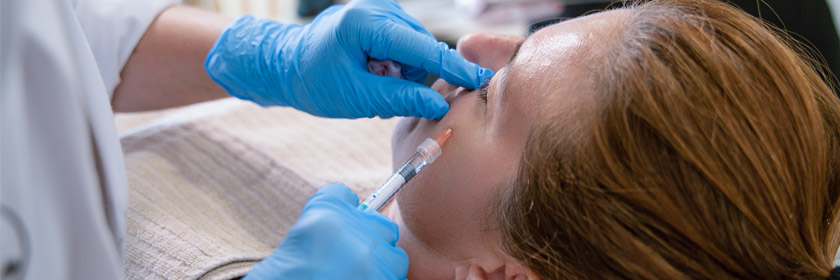Cosmetic Treatments

Are you thinking of having a cosmetic treatment?
Cosmetic treatments are growing in popularity due to social media, celebrity endorsements and online influencers.
Treatments such as lip fillers, dermal fillers and anti-wrinkle injections are being widely offered in a variety of environments, including domestic homes and other temporary locations.
Be Aware!
Concern has grown in recent years at the ever-increasing popularity and range of non-surgical cosmetic treatments on offer and the inadequacy of the legislative framework in Northern Ireland to regulate these treatments.
Many of the treatments being offered involve injectables such as dermal fillers and lip fillers, with no legal requirement at present for businesses or practitioners offering these treatments to be registered or licensed by Councils and routinely checked by Environmental Health Officers.
Any treatment which involves the injection of a substance or insertion of needles into the skin or the placing of threads under the skin is a non-surgical cosmetic procedure and have the potential to cause serious injury or harm to members of the public who chose to undergo them.
The practitioners offering these treatments require a greater level of skill, understanding and experience to perform them.
They should only be carried out by someone trained and qualified to provide them.
Regulation of Cosmetic Treatments
In England plans for the introduction of a licensing scheme are underway which will require those carrying out non-surgical cosmetic procedures to be licensed by their local authority.
Since October 2021 it has been illegal in England to provide Botox or filler treatments to anyone under 18.
At present, no similar law exists in Northern Ireland.
In 2022 we, in conjunction with other Councils in Northern Ireland, wrote to the Health Minister to ask for better regulation of cosmetic treatments in Northern Ireland, along with the introduction of a licensing scheme for non-surgical cosmetic procedures.
In the absence of a licensing scheme, we would strongly advise that anyone thinking of having a cosmetic treatment considers the following advice.
Choose Carefully
You need to have confidence that your practitioner is safe to practice.
When choosing your practitioner follow these simple steps:
- Check they are registered with a regulatory body like the GMC (General Medical Council), NMC (Nursing and Midwifery Council), GDC (General Dental Council), GPhC (General Pharmaceutical Council) or on an accredited register such as Save Face
- Ask to see their qualification and training certificates
- Confirm they have insurance and the products and equipment they use are licensed and genuine
- Check that if something goes wrong, your practitioner will be able to provide an emergency response and look after you
- Check if they can treat complications should they occur
Be Safe
- Take the necessary time to make your decisions.
Do not be pressurised into having a treatment by your friends or social media contacts - Do not be hurried into the treatment - ask for information in writing to take away
- Do not proceed with treatment if you do not feel comfortable with the practitioner or the environment
- Do not have treatment in your home, at ‘parties’ or in environments that are clearly not clean or appropriate
- Read any documents you are asked to sign and ask questions if you don’t understand
Further advice is available by contacting us at E: mea.envhealth@midandeastantrim.gov.uk.
Alternatively Save Face (an accreditation body for practitioners) have a Be Safe Checklist available on their Save Face website which contains useful information to consider before having a treatment.